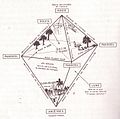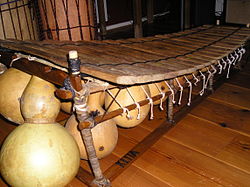Portal:Traditional African religions
IntroductionThe beliefs and practices of African people are highly diverse, and include various ethnic religions. Generally, these traditions are oral rather than scriptural and are passed down from one generation to another through narratives, songs, and festivals. They include beliefs in spirits and higher and lower gods, sometimes including a supreme being, as well as the veneration of the dead, use of magic, and traditional African medicine. Most religions can be described as animistic with various polytheistic and pantheistic aspects. The role of humanity is generally seen as one of harmonizing nature with the supernatural. (Full article...) Selected articleThe Ancient Egyptian religion was a complex system of polytheistic beliefs and rituals that formed an integral part of ancient Egyptian society. It centered on the Egyptians' interaction with many deities believed to be present in, and in control of, the world. Rituals such as prayer and offerings were provided to the gods to gain their favor. Formal religious practice centered on the pharaoh, the rulers of Egypt, believed to possess a divine power by virtue of their position. They acted as intermediaries between their people and the gods, and were obligated to sustain the gods through rituals and offerings so that they could maintain Ma'at, the order of the cosmos. The state dedicated enormous resources to Egyptian rituals and to the construction of the temples. Selected imagesFestivalsThere are several religious festivals found in the various Traditional African religions. Some of these are listed below next to their corresponding religion :
Selected biography
Sundiata Keita was a puissant prince and founder of the Mali Empire. The famous Malian ruler Mansa Musa, who made a pilgrimage to Mecca, was his great-nephew.
Written sources augment the Mande oral histories, with the Moroccan traveller Muhammad ibn Battúta (1304–1368) and the Tunisian historian Abu Zayd 'Abd al-Rahman ibn Muhammad ibn Khaldun al-Hadrami (1332–1406) both having travelled to Mali in the century after Sundiata’s death, and providing independent verification of his existence. The semi-historical but legendary Epic of Sundiata by the Malinké/Maninka people centers on his life. The epic poem is primarily known through oral tradition, transmitted by generations of Maninka griots. Selected quote
Ram Swarup quoted in Koenraad Elst (2002) Source: Swarup, Ram [in] Elst, Koenraad, Who is a Hindu? : Hindu Revivalist Views of Animism, Buddhism, Sikhism, and Other Offshoots of Hinduism, Voice of India (2002), p. 72, ISBN 9788185990743
Did you know
Related portalsTopicsFor more Traditional African religion topics, see Category:Traditional African religions.
CategoriesWikiProjectsThings you can doAssociated WikimediaThe following Wikimedia Foundation sister projects provide more on this subject:
Discover Wikipedia using portals |





























